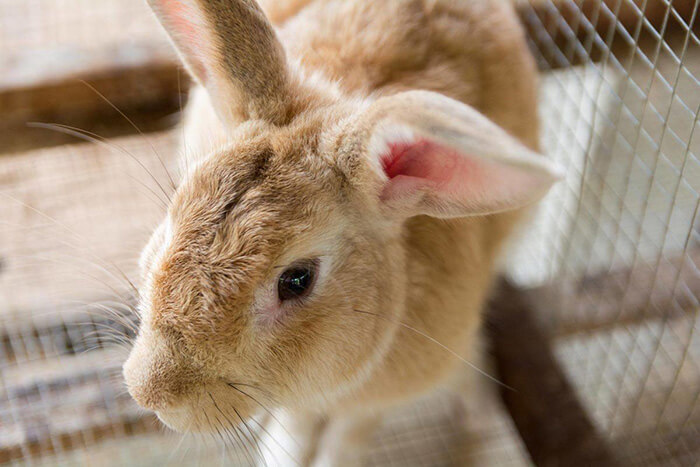

Rabbits are commonly mistaken for rodents, but they actually belong to the taxonomic order Lagomorpha. Varying in size between 8 to 20 inches long, rabbits boast powerful hind legs, a fluffy little tail, and a constantly twitching nose. Fluffy white, brown, buff, grey, or spotted, these intelligent mammals make excellent pets who live around 5 to 13 years. Once you have a handle on basic rabbit care, your family will benefit from this interesting, quiet, and sweet pet.
Infancy and Beyond
It’s difficult to determine the gender of young bunnies until approximately 6 months old. Because bunnies can reproduce as early as 4 months old, it’s important to either adopt one bunny at a time or keep them in separate hutches.
Rabbit care is fairly straightforward. They typically enjoy human contact and can be trained to use a litter box. Clean out urine and feces from the litter box, hutch, or tray as often as possible. We also recommend grooming a few times a week and keeping the nails trimmed. If you need help with any of these rabbit care items, please let us know.
Rules of “Thump”
Spending time with your rabbit can establish a strong bond between the two of you. They’re immensely social and curious, seeking companionship, mental stimulation, and exploration outside the cage or hutch.
Instead of picking a rabbit up by the ears, calmly place your hands inside the front arms, and use your forearms to support the length of the body. Stroke the belly to induce a trance-like state.
As with any pet, children should always be supervised around rabbits, as they can produce a powerful thump, use their claws to scratch, or even bite with their strong teeth. Rabbits are also prone to heart attacks if they become consumed with fear, so be sure to keep other household pets at a safe distance and do slow introductions, when necessary. Be careful when you pickup your rabbit, they can scare easy and leap out of your arms and without proper handling, a rabbit can suffer major physical injury.
Rabbit Care and Wellness
Your rabbit should visit the veterinarian 1-2 times a year to ensure his or her weight, nails, and teeth are in tip-top shape. Because they’re keenly aware of predators, rabbits hide illness or injury very well. Common problems include dental disease, respiratory infections, UTI’s, head tilt, bumble foot sores, and digestive upset.
The Yum-Yum’s
Rabbit care hinges on the food you provide. They must have fiber for a healthy GI tract that comes in the form of timothy or grass hays, pellets, and fresh leafy greens. An inverted water bottle or water bowl inside their house should be cleaned out and replenished regularly. Rabbits under 6 months of age can have an unlimited amount of pellets & vegetables while rabbits over 6 months of age should be limited to ⅛ – ¼ cup of pellets per day (per 5lbs of body weight) and about 2 cups of vegetables daily (per 6lbs of body weight). Rabbits of all ages can have unlimited amounts of timothy hay but they should never be allowed : alfalfa hay, avocado, cedar chips, chocolate, moldy/contaminated corn, house plants, nicotine, salt or salty foods.
Providing extra items for your rabbit to chew on will not go unnoticed. The hay you’re already giving him or her will help with the instinct to chew, but you can also give pressed alfalfa cubes, untreated pine lumber, apple, aspen, willow tree branches, or cotton towels (just be sure it’s not ingested!). Be sure to supervise rabbits whenever they are outside of their designated area – due to their chewing habits, rabbits are easily attracted to and will destroy various pieces of furniture, bite through electrical cords and find mischief wherever they can!
Spay and Neuter
Rabbits should be spayed or neutered around 6 months old. The following are some of the best reasons to follow through with this procedure:
- Female rabbits who aren’t spayed have a very high rate of uterine cancer or infection.
- Neutered males tend to live longer due to the lack of sexual aggression.
- Spayed or neutered rabbits make better companions and are easier to train.
- Intact rabbits tend to have fewer rabbit friends, as their hormones naturally produce aggression (and possible litters).
- Rabbit overpopulation is high, and we can all play a part in reducing these numbers.
Many rabbits are adopted this time of year, and they certainly make amazing pets. However, be sure you and your family are briefed on rabbit care before making any final decisions. Never give a rabbit as an Easter gift, over 90% of gifted rabbits won’t live to see their first birthday since unsuspecting new parents are not mentally or physically equipped to care for them.
For your rabbit wellness needs, we offer spay/neuter services as well as our basic wellness exams during our Walk-In Wellness Clinic from 3-4pm on Tuesdays & Wednesdays. Be sure to always bring your pet in a safe carrier so they feel safe & comfortable. We’d love to see your rabbit at our clinic for a checkup and for a spay/neuter! Please let us know if we can be of assistance.
